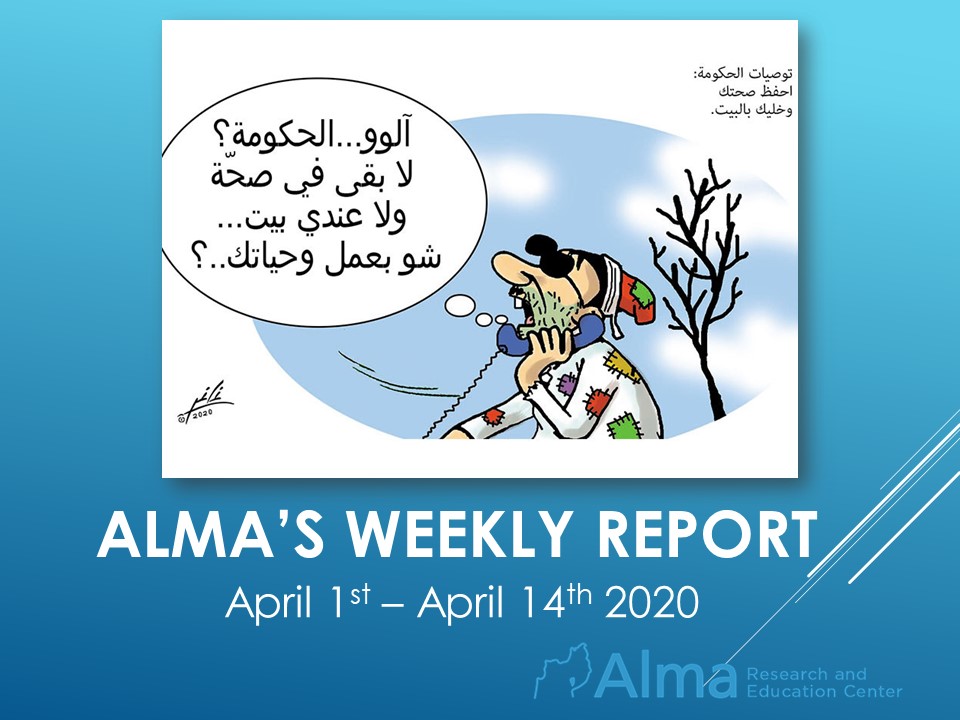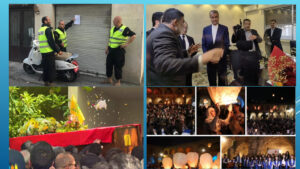Syria – Immersed in confusion: partial prevention measures were taken against the spread of the Coronavirus alongside denial and concealment of the severity of the virus outbreak in the country.
Formally, the authorities reported only a few dozen contaminated people, a number that does not reveal the actual number of the infected the regime is trying to hide. There are reports of patients in various hospitals in the country, reports of the ill among the Iranian militias in Syria and in the areas of Aleppo, Homs, Deir al-Zur, and Damascus around the climb to the holy shrine of al-Sayyida Zaynab.
Interestingly, the regime itself reported that it had set up an isolation facility near the shrine in Damascus so that visitors could stay there for 14 days.
However, Syria has officially been in lockdown for over two weeks and there are reports of promotional programs on the TV channels titled “stay at home for the sake of Syria”.
In areas where Corona cases were reported, including in the Quneitra province, the closure was tightened.
At the same time, reports that UNDOF soldiers infected with the virus vacated their positions in the town of old Quneitra due to the infection. Regime supporters took up the vacated positions.
Sources within the Rebel forces reported about 164 cases of infection among Syrian inmates.
The Syrian regime appears to have a serious problem with the Iraqi border villages in the Deir Azur region, the same villages exploited by the Iranian regime. On one hand, the need to allow the continued transfer of goods and troops from Iran and on the other hand rendering efforts to hide the outbreak of the virus epidemic in the region. In any case, it seems that despite statements by the Syrian government about the closure of land border crossings, the al Bukamal crossing stays open for the passage of arms, troops, and pilgrims traveling to Shiite holy places inside Syria. This situation prompts reports that these travelers are transporting the virus with them from Iraq and Iran.
In the Kurdish areas, protests are rising to blame the Syrian government for not doing enough to prevent the virus from spreading into their region.
At the same time, it seems that in the rebel-dominated areas, that are associated with the Salafist organizations, as in the Idlib area, there is an argument over the cancellation of prayers due to the virus caused restrictions. In these areas, there is probably no closure, as is the case in the rest of the country.
The great concern is that the Coronavirus will further aggravate the dire humanitarian situation in Syria since the civil war that broke out in 2011. An article in the Asharq Al-Awsat newspaper describes the state of poverty in the streets of Damascus, alongside high food prices.
Meanwhile, Syria presents – BUSINESS AS USUAL
One of the concerns arising from the Corona crisis is that a catastrophic situation in Syria will lead to the re-uprising of ISIS, which has not disappeared completely from the arena. We can see signs of this in a report by the Syrian Monitoring Center on ISIS’s widespread attack against regime forces and the militias loyal to them in the Syrian Desert in the eastern Homs periphery. Killed in the attack were 18 members of the regime and militia forces and 11 ISIS fighters. Russian airplanes attacked several battle arenas in order to curb the ISIS attack.
The Syrian News Agency announced in the Syrian oil ministry’s name that the increase in electricity rationing hours during this period is due to the security situation in the desert area. The result being the disabling of several gas wells in two gas fields in the area, leading to a large quantity of gas leaking, severely affecting the power grid. It may be assumed this is also a result of an ISIS cell attack in the area.
In southern Syria, instability continues. The “Orient” affiliated website reported the killing in March of some 40 opponents to the Syrian regime by Syrian authorities in the Daraa province a quarter of them were former opposition factions who refused to join Assad’s militias after the settlement.
At “horanfree.com”, we found an interesting piece of news that the Russian mercenary company “Wagner”, operating on behalf of the Russian government, recruited 350 young men from the Quneitra province to fight in Libya under the forces of General Hafter (supported by the Russians).
These young people will train in northern Syria and from there they will be sent to Libya. This is another example of the strengthening of the Russian influence in Syria and the utilization of Syrian resources in favor of Russian interests.
Lebanon – Sectoral conduct in combating the virus profiting Hezbollah
The low number of the ill and the deceased in Lebanon, despite accusations of concealment, is mainly due to the marginal number of Corona tests initiated (probably only a few hundred a day). It is therefore very difficult to assess what the real situation is in the country. Moreover, Lebanon has been in lockdown for over two weeks.
Residents in Lebanon seem to be responding to the closure. After initially observing traffic jams in the Nabatieh area, the Lebanese government and Hezbollah embarked on publicity campaigns regarding the importance of the closure. There is also evidence of the closure being enforced by the Lebanese security forces in the area of southern Lebanon.
Reports state that the virus has also spread to Palestinian refugee camps in Lebanon. People there live in high density and if found ill they are immediately evacuated to Hariri Hospital. If there is any truth in the reports, it could cause a dangerous outbreak. Lebanon has about 170,000 Palestinian refugees living in about six refugee camps along the coast.
The treatment of the disease in Lebanon is managed in a sectarian manner like everything else in the country. In this case, Hezbollah appears to be the most powerful organization.
Images and videos distributed on social networks show the Amal Movement, the Lebanese forces (Samir Geagea) and the Progressive Socialist Party giving out masks bearing their organization’s logos.

Hezbollah is committed to leading the fight against Corona in Lebanon, turning the threat into an opportunity to gain more support for the organization and its values
In this context, Hezbollah allocated thousands of doctors and nurses from its medical system to the fight against the virus and even integrated its military divisions to help in various ways – by assigning paramedics, setting up field hospitals and helping those in need in the villages.
Social networks, beyond the official campaign, reveal publications, indorsed by Hezbollah, that we believe are supporting the Hezbollah affiliated health minister in the way he is dealing with the Coronavirus, to the extent that Lebanese citizens with duel American citizenship consider Lebanon “safer than the United States”. In addition, according to a program published two weeks ago the Islamic Health Organization that is subordinate to Hezbollah will lead the fight against Corona. It appears that the organization’s activists are concentrating on treating Lebanese citizens landing at Beirut airport, identifying the “suspected ill” and dispatching them into quarantine.
Hezbollah’s interest in managing the “Lebanese return project to their country” as reported on the Al-Arabia news network, is the money brought into Lebanon by Hezbollah expatriates, those mainly returning from African countries where there are businesspersons and diamond dealers affiliated with the organization.
A report by the Center for Intelligence and Terrorism shows that Hezbollah is taking advantage of the effort it is directing to fight Corona for indoctrination purposes among Shiite activists and the Shiite public. It deals with four main issues:
- Comparing medical personnel to resistance fighters sowing the seeds of support in them if needed in a future situation of war with Israel.
- Public participation in the effort – a message that also projects enlistment towards the war in Syria and is likely to be applicable in future conflicts with Israel.
- Coexistence between Shiites and Christians in Lebanon – Although Hezbollah’s main investment in the fight against Corona exists, mainly in favor of the Shi’a population.
- Solidarity with the axis of resistance – Iran, and Syria – Hezbollah’s “usual” messages for exporting the Islamic revolution, fulfilling an oath of allegiance to the Supreme Leader and admiration to the Revolutionary Guard commanders.

An Al Mayadeen newspaper correspondent took a Hezbollah tour in the Dahiya district showing the media the means Hezbollah has taken and the resources allocated to deal with the Coronavirus. At the end of the article, it says, “Hezbollah knows when to appear. The pictures taken show the good extent of its resources in the Dahiya, which may be cost-effective in terms of organizational resources and above the ability of the entire Lebanese state to cope with this disease and its spread. Hezbollah’s steps are not the exclusive property of the Dahiya district, since they succeeded in preparing 19 centers all over Lebanon, and they are continuing their preparations establishing medical quarantine centers to take in Lebanese citizens returning from overseas capitals”.
At the same time, the Coronavirus has exacerbated the ongoing economic crisis in Lebanon and despite the closure; we can see the manifestation of common protests arising. Dozens of young people in the Al Salem neighborhood in Tripoli violated the closure holding protests in which they shouted, “We want to eat, and we’re hungry. Don’t shut us down, feed us!”
مظاهرة بي حي السلم وتقلي راح نخلص من الكورونا pic.twitter.com/w1KvklGjka
— bassel (@basselshehayeb) March 29, 2020
In a caricature featured in the Lebanese “Algeria” newspaper, on the left of the caricature, it says: “Government Guidelines – Stay Healthy and Stay Home”! The same caricature shows a person calling the government saying: “Hello, government, no health left, and I have no home. What should I do, damn-it!”?!










One Response
Great work ALMA. MK.